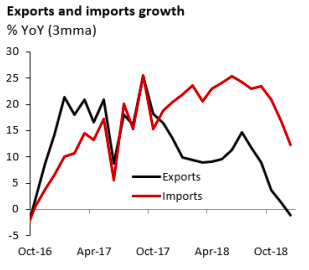Indonesian imports growth is expected to ease through this year compared to last year as lagged impact of Rupiah depreciation will start to take effect, in addition to lower oil price, according to the latest research report from DBS Economics.
Worsening trade balance is the biggest risk; despite declining oil price, the trade deficit will still likely widen to USD4.6 billion in Q4 2018 from USD2.6 billion in Q3 2018. Imports have eased significantly in December 2018 to 1.2 percent y/y from 11.8 percent y/y in November last year, but not enough to compensate the contraction of exports, recording -1 percent y/y in Q4 2018 from 9.5 percent y/y in the first three quarters.
Yet, the risk of exports slowdown might remain on the horizon despite the more competitive Rupiah as China and overall global trade demand fall. In fact, exports to China has already contracted significantly starting in November 2018, averaging -0.1 percent y/y from 33.5 percent y/y between Jan-Sep.
Even though terms of trade have improved with lower oil price, trade deficit might stay wide as the difference between imports and exports volume growth becomes wider. There are no short-term solutions to close this imports-exports gap. Industrialization plan to develop export-oriented industries would be beneficial in the medium run, the report added.



 Dollar Steadies Ahead of ECB and BoE Decisions as Markets Turn Risk-Off
Dollar Steadies Ahead of ECB and BoE Decisions as Markets Turn Risk-Off  Japanese Pharmaceutical Stocks Slide as TrumpRx.gov Launch Sparks Market Concerns
Japanese Pharmaceutical Stocks Slide as TrumpRx.gov Launch Sparks Market Concerns  South Korea’s Weak Won Struggles as Retail Investors Pour Money Into U.S. Stocks
South Korea’s Weak Won Struggles as Retail Investors Pour Money Into U.S. Stocks  Japan Economy Poised for Q4 2025 Growth as Investment and Consumption Hold Firm
Japan Economy Poised for Q4 2025 Growth as Investment and Consumption Hold Firm  South Africa Eyes ECB Repo Lines as Inflation Eases and Rate Cuts Loom
South Africa Eyes ECB Repo Lines as Inflation Eases and Rate Cuts Loom  Best Gold Stocks to Buy Now: AABB, GOLD, GDX
Best Gold Stocks to Buy Now: AABB, GOLD, GDX  Gold Prices Slide Below $5,000 as Strong Dollar and Central Bank Outlook Weigh on Metals
Gold Prices Slide Below $5,000 as Strong Dollar and Central Bank Outlook Weigh on Metals  Trump Endorses Japan’s Sanae Takaichi Ahead of Crucial Election Amid Market and China Tensions
Trump Endorses Japan’s Sanae Takaichi Ahead of Crucial Election Amid Market and China Tensions  Gold Prices Fall Amid Rate Jitters; Copper Steady as China Stimulus Eyed
Gold Prices Fall Amid Rate Jitters; Copper Steady as China Stimulus Eyed  Dollar Near Two-Week High as Stock Rout, AI Concerns and Global Events Drive Market Volatility
Dollar Near Two-Week High as Stock Rout, AI Concerns and Global Events Drive Market Volatility  Bank of Japan Signals Readiness for Near-Term Rate Hike as Inflation Nears Target
Bank of Japan Signals Readiness for Near-Term Rate Hike as Inflation Nears Target  Russian Stocks End Mixed as MOEX Index Closes Flat Amid Commodity Strength
Russian Stocks End Mixed as MOEX Index Closes Flat Amid Commodity Strength 































